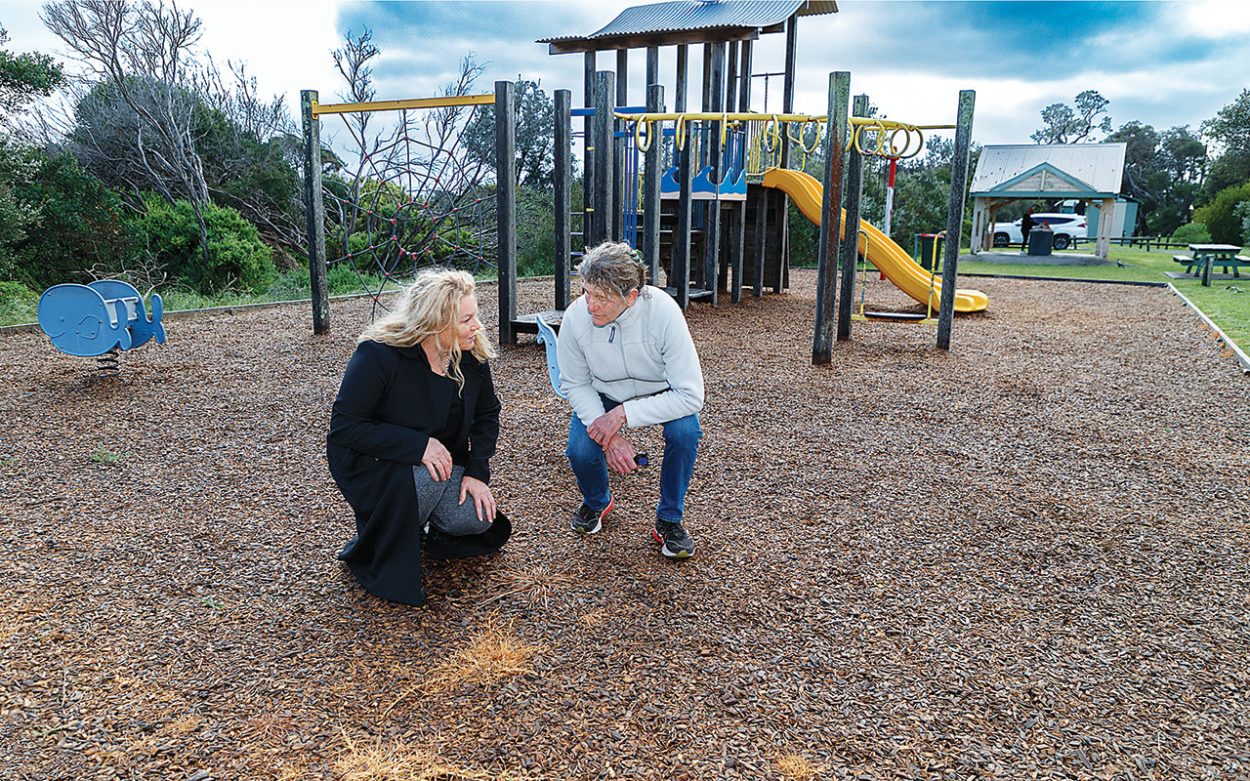A GROUP of parents have voiced their outrage after discovering that the controversial glyphosate-based weed killer, Roundup, had been used at a playground at Rye Bicentennial Park.
Mum Alexandra said she was shocked to see a maintenance worker holding a five-litre container with a nozzle to spray the herbicide on weeds on the tanbark within the playground located at Point Nepean Rd about 10am on Thursday 14 October – which the Mornington Peninsula Shire has since admitted to The News that it was an “operational error”.
“I was walking my dog and there was a contractor spraying tanbark in the playground,” Alexandra said, adding there were no signs to alert people that Roundup was being used between Government Rd and Weeroona St. Alexandra, who asked for her surname not to be used, said she spoke to the worker who confirmed they were using glyphosate, which he said had been approved by the shire including at the same site on three to four separate occasions this year.
The revelation has sparked anger among parents, who are now questioning the safety of their children. “I think it’s just unnecessary; the day before my child was literally crawling through the tanbark in that playground,” Alexandra said. She said it was also concerning given the theme for Children’s Week in the shire (from October 18-27) was “children have the right to a clean and safe environment”.
The shire’s infrastructure services manager Tom Haines-Sutherland said glyphosate was sometimes used by council staff and contractors for weed control, in accordance with guidelines provided by the Australian Pesticides and Veterinary Medicines Authority and WorkSafe.
“Although there are no specific recommendations for herbicide use in playgrounds, we have decided not to use herbicide in our playgrounds,” he said.
“Non-herbicide weed control such as hand removal is now our standard practice around playgrounds, and this is clearly stated in our maintenance contract. “Unfortunately, on this occasion an operational error was made. We are working closely with our teams to ensure this does not occur again and weeds are removed by hand in all of our playgrounds.”
While Alexandra welcomed the change to hand removing weeds, which she only heard through The News, this was only “so long as its enforced and applied across all shire playgrounds”. But she said it also did little to quell the concerns of parents who had seen workers conducting weed spraying along the peninsula including recently at a playground in Flinders. “We don’t know how long or how often it (Roundup) has been used,” she said, noting that a year ago she had seen workers wearing “full body outfits” and masks to spray weeds “with trucks and hoses” at a picnic area next to the Rye pirate ship playground “while heaps of kids, people, and pets were around”.
“The consensus is that we’re going to stop taking our kids to all playgrounds until we have confirmation that the policy has changed, and the use of Roundup and any other harmful methods is banned in children’s playgrounds and other public spaces children use.”
Alexandra said after raising the issue with councillors, she was told glyphosate had been questioned in the past, but council continued to used it as a “preferred low-cost option”. Professor of Chemistry at RMIT University Oliver Jones while he understood lot of people worried about glyphosate “as it is in the news a lot, respectfully, feelings are not facts”. He said there was no good evidence that products containing glyphosate posed a significant risk of causing cancer in humans.
“Neither clicks and likes online, nor influencers, nor legal cases make science. All the available scientific evidence indicates glyphosate is safe to use as directed. This is why it is approved by over 20 regulatory agencies worldwide, including Australia.
“You could never use any pesticide again for the rest of your life, and you would still be at risk of cancer from other things like alcohol, poor diet, sunlight and even your genetics.” But he added from his perspective, a “sensible approach” would be to wait several hours after glyphosate was sprayed in public places like playgrounds before the space was used to “avoid unnecessary worry”. Jones said from his understanding, glyphosate was not presently banned in any part of the world, but some countries do restrict its household use such as France, the Netherlands and Belgium.
A Federal Court case involving 800 Australians who claimed their diagnosis of non-Hodgkin lymphoma was linked to Roundup was also dismissed this year after the judge found there was no evidence that it caused cancer.
Mornington Peninsula resident and founder of Save the Bees Australia Simon Mulvany has been campaigning close to a decade to have glyphosate banned on the peninsula, which he believes, through his own research, is not only harmful to bees and humans but also contaminates honey. Mulvany said he personally witnessed a vehicle with workers “spraying glyphosate out the window of the truck” on Canterbury Jetty Rd in Rye about a week ago. “A lady with a pram and a dog was walking on the side of the road through the poison – there were no signs either,” he said.
Any readers who have seen or heard about the use of Roundup on the peninsula, and would like to share their experiences, are encouraged to contact The News.
First published in the Mornington News – 22 October 2024




